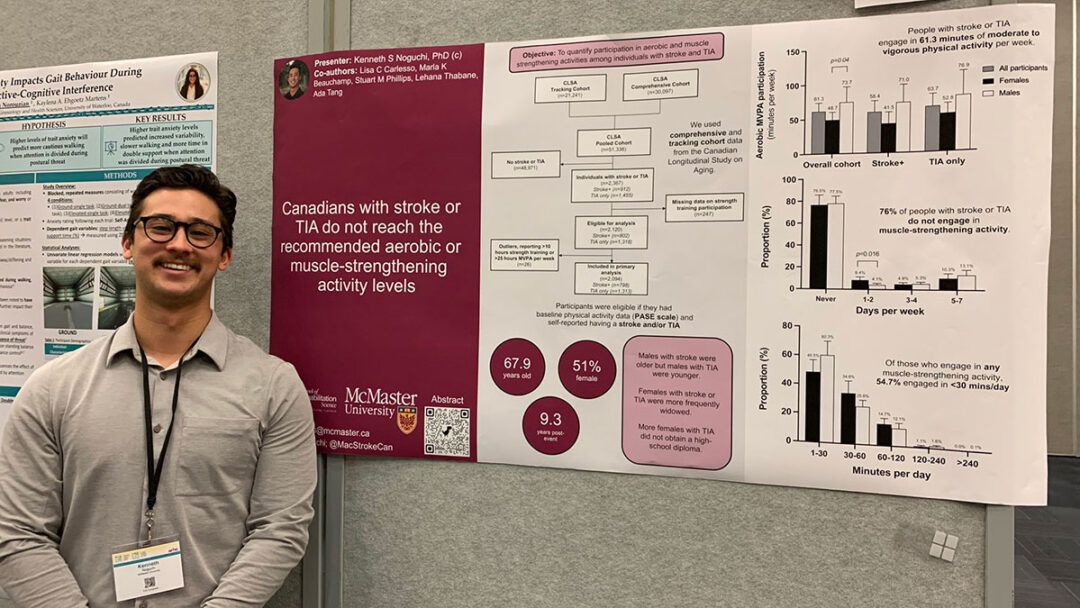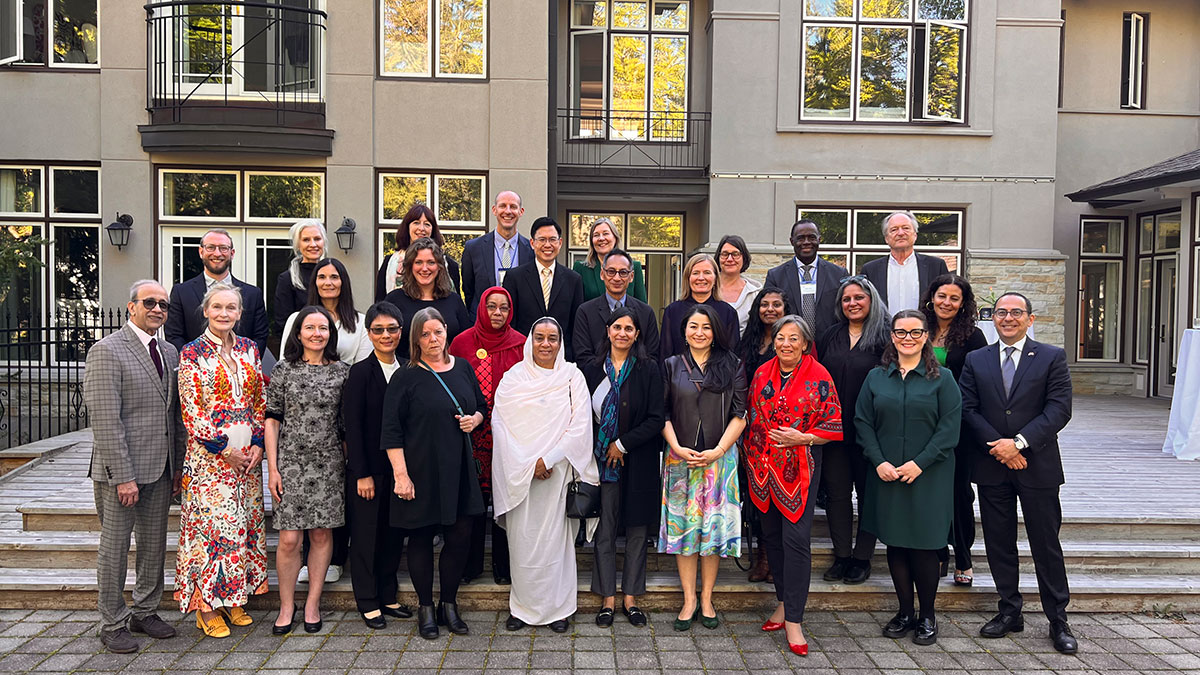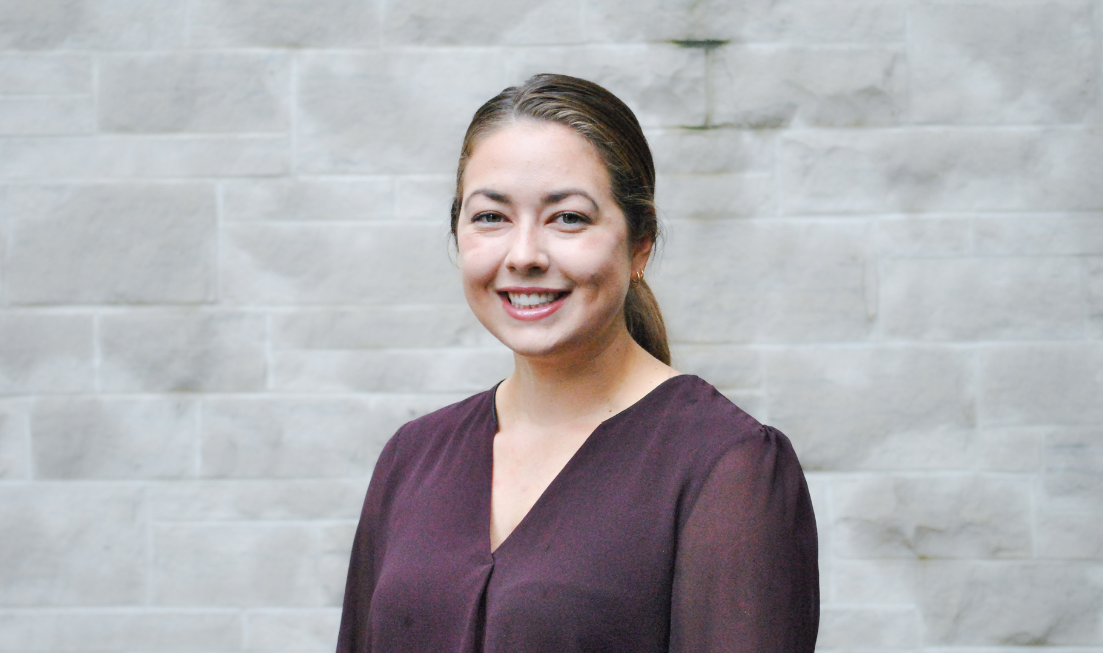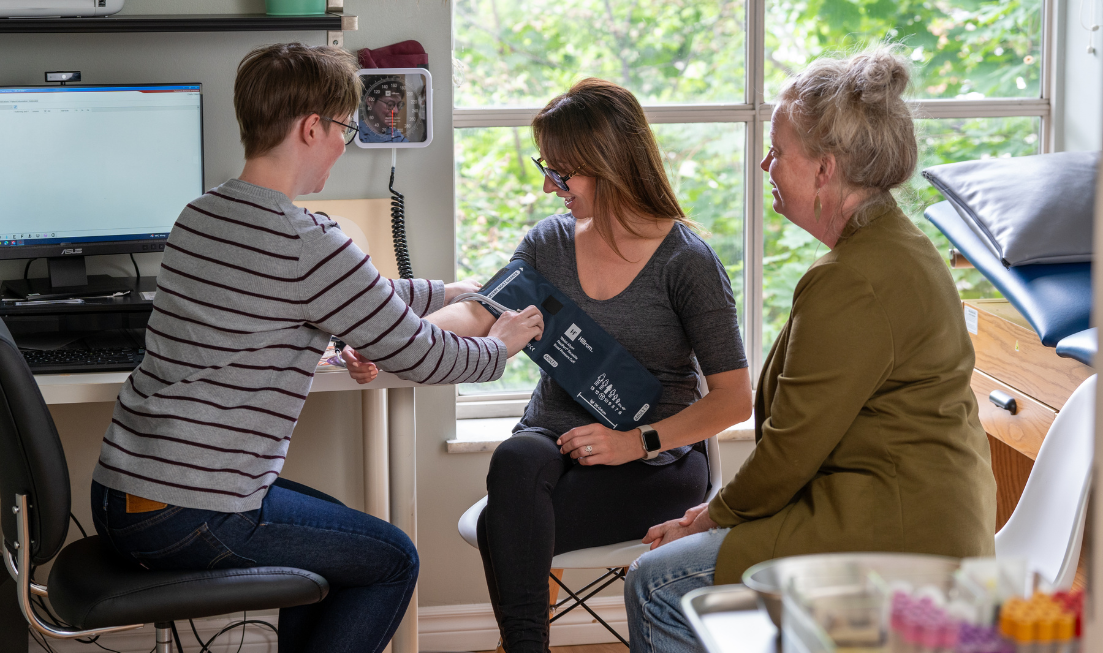Three degrees & a wedding at The Phoenix. This grad reflects on a decade at McMaster

Ten years, three degrees, nearly 30 publications and an on-campus wedding.
It’s challenging to sum up Kenny Noguchi’s McMaster University experience, which he describes as, “In a nutshell, powerful.” This week, Noguchi will close the chapter on his time at McMaster when he graduates with a PhD in Rehabilitation Science.
Finding his way after a “rocky start”
Noguchi’s journey at McMaster University began in 2014, studying Kinesiology and living at Matthews Hall.
“I remember Welcome Week so vividly,” says Noguchi. “I remember the Kinesiology Welcome Week rep getting me out of the car and seeing the craziness of university and that first week.”
Noguchi tried out for and made the Marauders baseball team and quickly began making friends. But like many first-years, Noguchi had a tough time adjusting academically. Coming from an all-French language school – where he learned math, physiology, and grammar all in French – he found the transition challenging.
“I was off to a rocky start and was on academic probation for the first two years. I remember being in an Anatomy lecture and the professor telling us the first class or two would be a review for us all – but I knew none of the terms, it was all new to me,” he says.
The experience, which he describes as “eye-opening,” forced Noguchi to reflect on not just what he wanted to learn, but how he wanted to learn.
“I had to learn how to learn,” he says. “One thing McMaster did for me was teach me different approaches and processes for learning, and how to absorb information. And the second thing was that I just followed what I enjoyed. I picked classes I enjoyed and ultimately did my research in an area I enjoyed. That makes a world of a difference when you’re struggling.”
Noguchi worked his way out of probation, eventually being recognized for his academic excellence as a Marauder Scholar, which celebrates student-athletes who achieve a 9.5 grade point average (GPA) or higher over a minimum of 24 academic units. He also became captain of the McMaster men’s baseball team before an elbow injury in his third year forced him to the bench.
“I came back after surgery to fourth year a shell of myself and I was so disappointed,” he says. “But I think that’s where I learned that I could lead in other ways, not just on the field but by supporting my teammates.”
His sportsmanship transcended McMaster – he coached a U15 baseball team in Burlington, and for two summers was involved with the Jays Care Foundation where he travelled across Canada, using baseball to deliver mental and physical health education to thousands of Indigenous youth, individuals with physical and developmental disabilities, and urban-city youth in community housing.
Catching his stride
Noguchi’s curiosity led him to pursue a master’s degree and then a PhD in Rehabilitation Science, where he grew passionate about community-based research. He was very involved with the McMaster Institute for Research on Aging (MIRA) and became co-chair of the MIRA Trainee Network, which connects trainees from across all six McMaster Faculties — creating an opportunity for interdisciplinary exchange and networking. He also co-chaired the Rehab Science Student Council.
His dissertation pushed into an understudied but important area of stroke research, strength and power training for stroke recovery, which his graduate supervisor, Ada Tang, says influenced her own research program.
“Kenny is a rising leader in stroke research, excelling across all traditional metrics – GPA, publications, presentations, scholarships and grants,” says Tang, professor and assistant dean of Rehabilitation Science in the School of Rehabilitation Science. “But to me, more importantly is the way he conducts himself in research that makes him an exceptional representative of McMaster. He is curious and resourceful, and conducts himself with the highest standards of integrity.”
The characteristic of integrity is one Noguchi says was modelled by Tang, and one he intends to carry throughout his career.
“What she values the most, above all else, is being a good person,” Noguchi says of his supervisor. “She took the time out of her busy, busy schedule and would set aside a couple of hours each week for me and other PhDs to talk about what we valued and future opportunities. She helped me and others come to conclusions about what we wanted, and that speaks volumes to the kind of person she is.”
A new chapter
What Noguchi learned he wanted was to take his research one step further.
“We know from my thesis that over 75 per cent of people who had stroke do not engage in any type of muscle-strengthening activity,” he says. “I want to understand what influences participation in physical activity for people with disabilities. I’ll be looking at whether the quality of physical activity participation influences the quantity.”
Noguchi will be exploring this in a postdoctoral fellowship at UBC Okanagan, where he’ll be co-supervised by physical activity researcher Kathleen Martin Ginis and stroke researcher Brodie Sakakibara, who was introduced to him by Tang.
The start of his postdoctoral fellowship is a bittersweet moment for Noguchi, who will be saying goodbye to McMaster after a decade.
“It’s sad. Any grad student who does community-based research will tell you that you build such a strong relationship with clinicians, patients, even their families – and so it hurts to leave them and it’s really hard to say goodbye,” says Noguchi.
But before packing up and starting his new chapter out west, Noguchi and his partner – who he met at McMaster – marked the moment with a special event: a wedding ceremony and reception at McMaster’s legendry on-campus restaurant and bar, The Phoenix.
“I used to work the front desk at the David Braley Athletic Centre – and that’s where we met,” he says of his now-wife, who graduated from McMaster’s nursing program in 2020.
“We were thinking about different venues and ultimately decided McMaster would be sort of a full-circle moment for us. Everyone was so great, they made us feel right at home, which is what it was for me for 10 years. It was a special and emotional moment,” he says.
Noguchi and his wife recently moved to Kelowna, where he’s eager to get started on his postdoc. Though he’s technically saying bye to McMaster, it’s clear from his first postdoc project that farewell might be too final for the small world of rehabilitation science.
“We were just awarded a CIHR project grant to do a multi-site randomized trial… between UBC Okanagan and McMaster,” he says.
Education, School of Rehab ScienceRelated News
News Listing

New Mary Heersink School of Global Health and Social Medicine at McMaster University
Education, Feature, Global Health
1 day ago

Brighter World ➚
Mac grad Rebecca Correia is creating a better future for Canada’s seniors
Dept. HEI, Education, Graduate
5 days ago

Daily News ➚
McMaster ranked one of the world’s best universities for medical and health studies
Education
5 days ago
